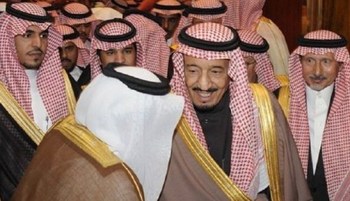(AhlulBayt News Agency) - One of the earliest instances in which Saudi Arabia flexed its expanding soft power in West Africa was in 1999 when Zamfara, a region where ISIS terrorist group affiliate Boko Haram has been active, became the first Nigerian state to adopt so-called Wahhabi Sharia.
A Saudi official stood next to Governor Ahmed Sani when he made the announcement. Freedom of religion scholar Paul Marshall recalls seeing some years later hundreds of Saudi-funded motorbikes in the courtyard of the governor’s residence.
They had been purchased to enforce gender segregation in public transport. Sheikh Abdul-Aziz, the religious and cultural attaché at the Saudi embassy in Abuja, declared in 2004 that the kingdom had been monitoring the application of Islamic law in Nigeria “with delight.”
Later on, a Boko Haram founder who was killed in 2009, Muhammad Yusuf, was granted refuge by the kingdom in 2004 to evade a Nigerian military crackdown.
In Mecca, he forged links with like-minded Wahhabi clerics that proved to be more decisive than his debates with Nigerian clerics who were critical of his interpretation of Islam.
Once back in Maiduguri, the capital of Nigeria’s Borno state, Yusuf built with their assistance a state within a state centered around the Ibn Taymiyyah mosque.
Yusuf’s religious teacher, Sheikh Ja’afar Adam, a graduate of the Islamic University of Medina, presided over a popular mosque in the Nigerian city of Kano that helped him build a mass audience.
Adam’s popularity allowed him to promote colleagues, many of whom were also graduates of the same university in Medina, who became influential preachers and government officials. Adam was funded by Al-Muntada al-Islami Trust, a London-based charity with ties to Saudi Arabia.
Adam publicly condemned Yusuf after he took over Boko Haram. In response, Yusuf in 2007 order the assassination of Adam.
Nigerian journalists and activists see a direct link between the influx of Saudi funds into Yusuf’s stomping ground in northern Nigeria and greater intolerance that rolled back the influence of Sufis that had dominated the region for centuries.
“They built their own mosques with Saudi funds so that they will not follow Shiites in prayers and they erected their own madrasa schools where they indoctrinate people on the deviant teachings of Wahhabism.
With Saudi petro-dollars, these Wahhabis quickly spread across towns & villages of Northern Nigeria… This resulted in countless senseless inter-religious conflicts that resulted in the death of thousands of innocent Nigerians on both sides,” said Shiite activist Hairun Elbinawi.
No surprise then that a recent phone call to Nigerian President Mohammed Buhari in which King Salman expressed his support for the government’s fight against terrorist groups was widely seen as Saudi endorsement of the military’s crackdown on the country’s Shiite minority, but not toward the Boko Haram terrorists.
The state-owned Saudi Press Agency quoted Salman as saying that Islam condemned such “criminal acts” and that the kingdom – in a reference to Iran – opposed foreign interference in Nigeria.
In the process, African politicians and ultraconservatives in cooperation with Saudi Arabia have let a genie of intolerance, discrimination, supremacy and bigotry out of the bottle.
Indeed, Africa is witnessing the world’s highest rates of conversion to Shi’a Islam since many Sunni tribes in southern Iraq adopted Shiism in the 19th century.
The share of Shiites has jumped from 0% in 1980 to 12% of Nigeria’s 90-million strong Muslim community in 2012. A Pew Research survey suggests that that has changed dramatically.
Iranian pattern in responses to Saudi promotion of Wahhabism have primarily been cultural and religious in nature in Africa.
The potential threat is significantly enhanced by poor governance and the rise of Saudi funded terrorist groups like Boko Haram, Al Qaeda in the Maghreb and Al Shabab in Somalia.
While their ideological roots can be traced back to ultra-conservatism, their political philosophy views Saudi Arabia as an equally legitimate target because its rulers have deviated from the true path of Islam.
At the bottom line, both Africans and Saudis are struggling to come to grips with a phenomenon they opportunistically harnessed to further their political interests; one that they no longer control and that has become as much a liability as it was an asset.
Now, it would be better to acknowledge that the Saudis are the ones creating the conditions for more chaos in places like Nigeria, regardless of the situation other theaters of confrontations.
/106
source : Globalist
Friday
3 February 2017
10:25:39 AM
809115

The Saudis are the ones creating the conditions for more chaos in places like Nigeria over Shiites, regardless of the situation other theaters of confrontations.
